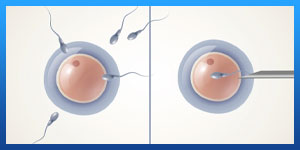1Is ICSI Safe for Babies?
Is It Safe for the Baby? ICSI-IVF comes with all the risks of a regular IVF cycle, but the ICSI procedure does introduce additional ones. A normal pregnancy comes with a 1.5 to 3 percent risk of major birth defect. ICSI treatment carries a slightly increased risk of birth defects, but it's still rare.
2Do IVF babies have birth defects?
IVF Babies and Major Birth Defects. June 11, 2010 -- Slightly more than 4% of babies born via assisted reproductive technology such as in vitro fertilization (IVF) may have major birth defects, such as heart and urogenital tract malformations, according to a new study
3Can ICSI cause chromosomal abnormalities?
Studies show that ICSI and IVF lead to a similar percentage of birth defects as babies conceived naturally. However, the ICSI risk of having a baby with abnormalities is very minimal (less than 1 percent). ... Some specific risks for birth defects with ICSI include: Sex chromosome abnormalities.
4Does ICSI damage the egg?
Egg Damage
The most immediate concern with ICSI is that in the process of trying to fertilize an egg, some eggs will be damaged. Today, good labs manage to achieve fertilization in 70 – 80% of eggs inseminated with ICSI, and likely about 5% of good quality eggs will be damaged in the process
5Are ICSI babies normal?
IVF, ICSI Babies as Healthy as Others. July 2, 2003 -- Babies born with the assistance of the infertility treatments in vitro fertilization (IVF) and intracytoplasmic sperm injection (ICSI) don't face any more health problems than babies conceived by natural means, according to the longest-running study to date.Jul 2, 2003
6Does ICSI affect gender?
Australian researchers found the odds of a boy went up from 51 in 100 when conceived naturally to 56 in 100. But another assisted reproduction technique called ICSI, which singles out the sperm that will fertilise the IVF egg, makes a girl more likely.
7Does ICSI increase birth defects?
The incidence of genitourinary tract abnormalities is statistically significantly increased in children conceived by IVF/ICSI. The findings are consistent with other studies that suggest that patients with subfertility are at higher risk of having a child born with congenital abnormalities
8Does IVF guarantee healthy baby?
About 5 million kids worldwide have been born from IVF, says Hershlag, and most are healthy. ... Based on the available data, “in general we tell parents that IVF is safe and to a large degree, babies born from IVF are healthy and grow into healthy adults,” says Hershlag
9Is ICSI better than IVF?
Research shows that IVF is just as effective as the ICSI procedure, where sperm is injected directly into an egg, when there is no male infertility factor. ... In assisted reproductive technology (ART) there are two ways eggs can be fertilised: IVF (in-vitro-fertilisation) or ICSI (intracytoplasmic sperm injection)
10What is the success rate of ICSI?
The most important indicator of ICSI success appears to be the fertilization rate achieved with the ICSI procedure. The fertilization rate in the UCSF IVF laboratory is exceptional — currently 80 to 85 percent. That is to say, on average, eight out of every 10 eggs will fertilize normally.



